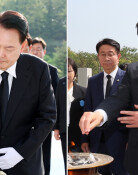LG`s Company-wide English Initiative Catches On
LG`s Company-wide English Initiative Catches On
Posted March. 22, 2010 05:42,
English conversation classes begin at 9:30 a.m. every weekday for 25 chauffeurs of LG Electronics executives. The venue is an underground parking lot at the companys headquarters in Seouls financial district of Yeouido.
The chauffeurs learn English expressions such as Welcome to LG Electronics, and Well serve you safely during your stay in Seoul.
Interpreters used to accompany chauffeurs to pick up foreign buyers, but not anymore because of LGs initiative to use English as its second official language that began two years ago.
LG became the first company in Korea to use English as an official language in 2008. Many domestic companies emphasized the necessity of using English as an official language, but no company took the lead until 2008.
Since 2008, LG has conducted management meetings in English and required business documents to be written in the language. Its computer systems language related to personnel, accounting, production and sales was also changed to English.
Critics said the English policy would not last long. LG employees also criticized it as inefficient and stressful.
Two years after the initiative began, however, the number of employees able to draw up and comprehend documents in English has risen.
Kim Na-mi, head of the English Communication Center, an in-house translation and interpretation department, said, As recently as two or three years ago, our main work was to translate English documents. These days, however, we mostly do interpretation.
Interpretation requests from foreign executives outweigh those from domestic workers as the former became more active in overseas business.
The English speaking skills of employees have also improved. LGs consumer electronics division in Changwon, South Gyeongsang Province, an exemplary unit in implementing the English campaign, said in a seminar in November last year, The average scores of the English speech test SEPT for our employees grew from level 3.3 in 2006 to level 5.2 last year.
Hong Jeom-pyo, head of the companys home entertainment division, said, I feel comfortable using English after the initiatives implementation.
The campaign has raised the number of opportunities for LG staff to expose themselves to English, including through CEO messages, reports and company newsletters. English conversation clubs in the company have also mushroomed.
Since LG favors staff with English proficiency, those who are not good at the language have little chance of getting hired or promoted.
For promotions, the company uses as a barometer English speaking skills through the Test of English for International Communication. For hiring, one-on-one interviews in English are held.
Experts say this change was possible because the company adopted English as its official language, and not one to be used along with Korean.
The companys overseas branches have welcomed the move. Thanks to the campaign, the branches have led the way in developing high-quality premium products instead of focusing on low and mid-priced ones as in the past.
Development of high-quality products requires information sharing between headquarters and overseas branches, but the language barrier was an obstacle. After English communication was emphasized, business cooperation between the two sides was enhanced, strengthening research and development capabilities at overseas branches, company sources said.
Preference for LG Electronics by people in the countries with LG branches has also grown because of the English use campaign.
As the companys global image grows due to the initiative, the number of locals abroad applying to work for the company has grown two to three times from the past, an LG source said.
Business flow between headquarters and overseas branches has become much smoother as well. In the past, it took twice as long to conduct business meetings since they needed interpretation. Now, interpreters are rarely needed at such meetings.
Despite such benefits, many complain about the policy. One employee said, I feel frustrated when I have to write a report in English, which takes two hours. It would take me just 30 minutes if I wrote it in Korean. Experts say this type of inefficiency is a challenge for the company to overcome.
Other critics say LG puts disproportionate emphasis on English proficiency though the language is simply a means. Employees and executives suffer from stress when English is the sole criterion for promotion, they said.
The biggest change, however, is the companys atmosphere in which employees accept English as an official language regardless of their English skills.
Mo Jong-lin, a professor at the Graduate School for International Studies of Yonsei University in Seoul, said, To attract talented foreigners and succeed as a global company, adopting English as the official language is a must, not a choice.
achim@donga.com sublime@donga.com







